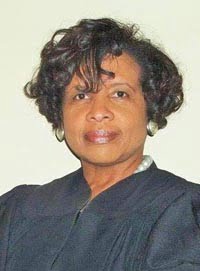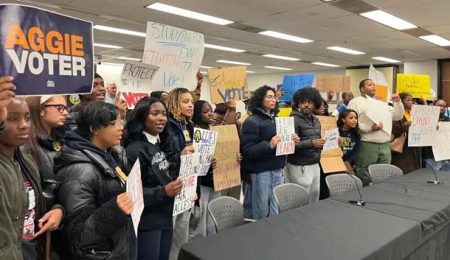Judicial Candidates Vie for State’s High Courts
By Cash Michaels
As the pivotal November 8th general election draws near, with Early Voting beginning Thursday, October 20 and ending Saturday, Nov. 5, voters must consider a large slate of candidates vying for seats on the NC Supreme Court and NC Court of Appeals, the two highest courts in the state.
With several African American judges and attorneys running for those seats, the composition of the two courts could become dramatically more diverse than at present.
Legislation enacted on June 30, the last day of the 2016 General Assembly session, changed the order in which candidates for judicial seats appear on the ballot. Under the new laws, all the Republican candidates’ names appear first, and Democrats’ names below them. Some studies suggest that appearing first on the ballot gives a candidate a slight advantage; however, because judicial races generally are not high-profile contests, knowing the party affiliation through ballot position may be helpful in remembering which of several candidates a voter prefers.

NC Supreme Court
At the top of the judicial ballot is the state Supreme Court race, in which Wake County Superior Court Judge Michael Morgan, a Democrat, is running to oust the Republican incumbent, Associate Justice Robert H. Edmunds Jr., for an eight-year term. If Judge Morgan wins the seat, it would immediately shift the balance on the 4-3 Republican-majority court. Judge Morgan would also join Associate Justice Cheri Beasley as the second African American serving on the state’s seven-member High Court, and the court’s only black male.
“Supreme Court justices review the courts’ records that are generated in the lower courts. They are a reviewing court to see what errors have potentially been committed in the courts below,” says Morgan. “This [NC Supreme Court] seat must be guaranteed to be fair and impartial, and the fact that I’ve been elected and re-elected by the great citizens of Wake County shows that I have that capacity,” he says. With over 26 years on the North Carolina bench, Morgan has also received top ratings for his professionalism and integrity by his legal peers.
A native of Cherry Point, NC, Morgan is the oldest of five children. He graduated from New Bern public schools and received his B.A. in both History and Sociology from Duke University in 1976. He earned his Juris Doctor degree with honors from North Carolina Central University in 1979. From 1983 to 1989, he was an assistant state Attorney General in the NC Dept. of Justice. He then served five years as a NC administrative law judge, the next eleven years (1994 – 2004) as a District Court judge, and since 2005 has held his seat on the Wake County Superior Court.
It’s worth noting that, if Edmunds is reelected, he can serve only half of an eight-year term. Now 68, he will be required to step down at age 72, leaving the governor to appoint his successor.
NC Court of Appeals
Four African American candidates are striving to gain seats on the NC Court of Appeals, the second-highest level of the state judiciary. Three are challenging incumbent Republican judges; the fourth is running for an open seat. A fifth Appeals Court seat, held by Judge Linda Stephens, a Democrat, is being sought by Phil Berger, Jr., whose father is the Republican President Pro Tem of the NC Senate.

The “Hunter/Jones” race
Wake County trial attorney Abraham (Abe) Penn Jones, who previously served as a Superior Court judge for many years, is challenging incumbent Court of Appeals Judge Robert Hunter, Jr.
“While there is an abundance of legal talent in our state, I believe it would be difficult to find a candidate with the extent of my experience,” says Jones.
After graduating from Harvard Law School in 1977, Jones served two years as a law clerk in the U.S. District Court and the U.S. Court of Appeals of the District of Columbia. He was appointed Assistant U.S. Attorney for the Eastern District in 1979 and served four years, then spent a year in private practice with the law firm of Kirby, Gillick, Schwartz and Tuohey.
Named Associate Attorney General in the NC Attorney General’s office in 1984, Jones handled Medicaid fraud cases; two years later he was appointed an administrative law judge. He headed up his own law practice for five years and was an elected member of the Wake County Board of Commissioners from Dec. 1990 to Dec. 1994, after which served on the bench in the Tenth Judicial District from 1995 to 2012, presiding over civil and criminal trials, among other duties.
“These perspectives give me the balanced, practical skills that are necessary to fulfill the duties of an Appeals Court judge,” says Jones, who is “Fairness, honesty, intellectual capacity, a working knowledge of the law, and a strong work ethic are qualities that I value and possess.”
The Wake county native graduated from William G. Enloe High School in 1970 and attended Harvard College from 1970 to 1974 before enrolling in law school. The father of two daughters, Jones is a member of Martin Street Baptist Church in Raleigh.

Dietz/Rozier race
Another jurist vying for the NC Court of Appeals is Wake District Court Judge Vince Rozier of the 10th Judicial District, challenging incumbent Republican Richard Dietz. Rozier was appointed to the Wake County District Court bench in 2006 at age 29, the youngest judge ever sworn to the seat. He lost re-election in the Republican wave of 2010, but was re-appointed in the spring of 2014, and won re-election that fall. Rozier has ruled in criminal, child support, and juvenile delinquency cases.
Rozier has also served as ombudsman for the State Bureau of Investigation, and from 2001 to 2006 he was a prosecutor in the Wake District Attorney’s office.
Judge Rozier graduated from UNC-Chapel Hill in 1998 and from NC Central University’s School of Law in 2002.
“My years of real courtroom experience have equipped me well to serve on the Court of Appeals,” Judge Rozier says. “This is experience that our court is currently lacking.”

Zachary/McKoy-Mitchell race
Also seeking election to the NC Court of Appeals is Mecklenburg County District Court Judge Rickeye McKoy-Mitchell of the 28th Judicial District. Judge McKoy-Mitchell was first elected to the bench in 1998 and has presided over criminal, civil and juvenile cases.
Judge McKoy-Mitchell earned both her BA and her law degree from UNC-Chapel Hill. Prior to being appointed to the bench, she served as staff attorney for Legal Services of the Southern Piedmont; attorney advisor for the Office of Hearings and Appeals of the Social Security Administration; senior trial attorney for the Equal Employment Opportunity Commission; and Assistant District Attorney in the 26th Judicial District.
“I am well-prepared to serve on the North Carolina Court of Appeals. It is my distinct honor and privilege of having the longest tenure among those currently serving as a District Court Judge in the 26th Judicial District.”
With 14 years of legal experience in state and federal courts, Judge McKoy-Mitchell seeks to unseat incumbent Appellate Judge Valerie Zachary.

Murphy/Eagles-Buie race
Winston-Salem attorney Donald R. Buie is also a candidate for the NC Court of Appeals, hoping to succeed Judge Martha Geer, who stepped down from the court last May. Buie has unsuccessfully run for judicial seats in both the 21st and 18th Judicial Districts, in 2012 and 2014 respectively.
Attorney Buie is running as an unaffiliated (independent) candidate against Republican attorney Hunter Murphy and Democratic District Court Judge Margaret Eagles. He has been an attorney in Winston-Salem since 1981, after he earned his law degree from NCCU School of Law that same year. He earned his BA from UNC-Chapel Hill in 1978.
“I believe my wide range of experience as a practicing attorney uniquely qualifies me for this position,” he says. “Having experience in the preparation and presentation of cases at the trial court levels naturally gives me a better understanding when reviewing at the appellate level.”
The fifth race, between incumbent Democrat Linda Stephens and Republican challenger Phil Berger, Jr., is listed on state Board of Elections information as the Berger/Stephens contest.







